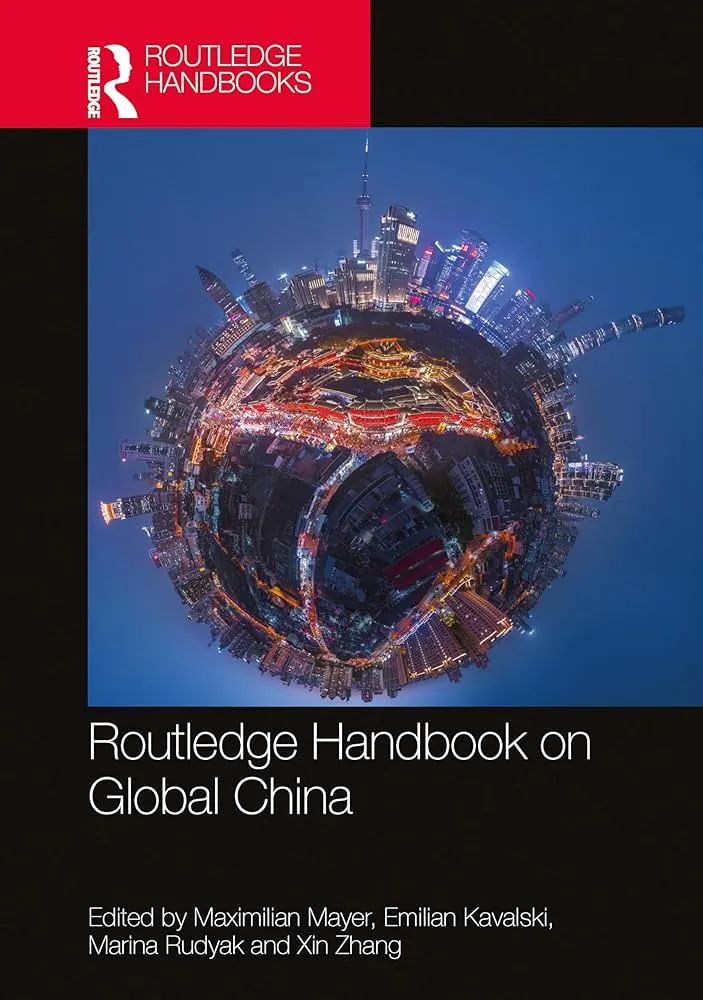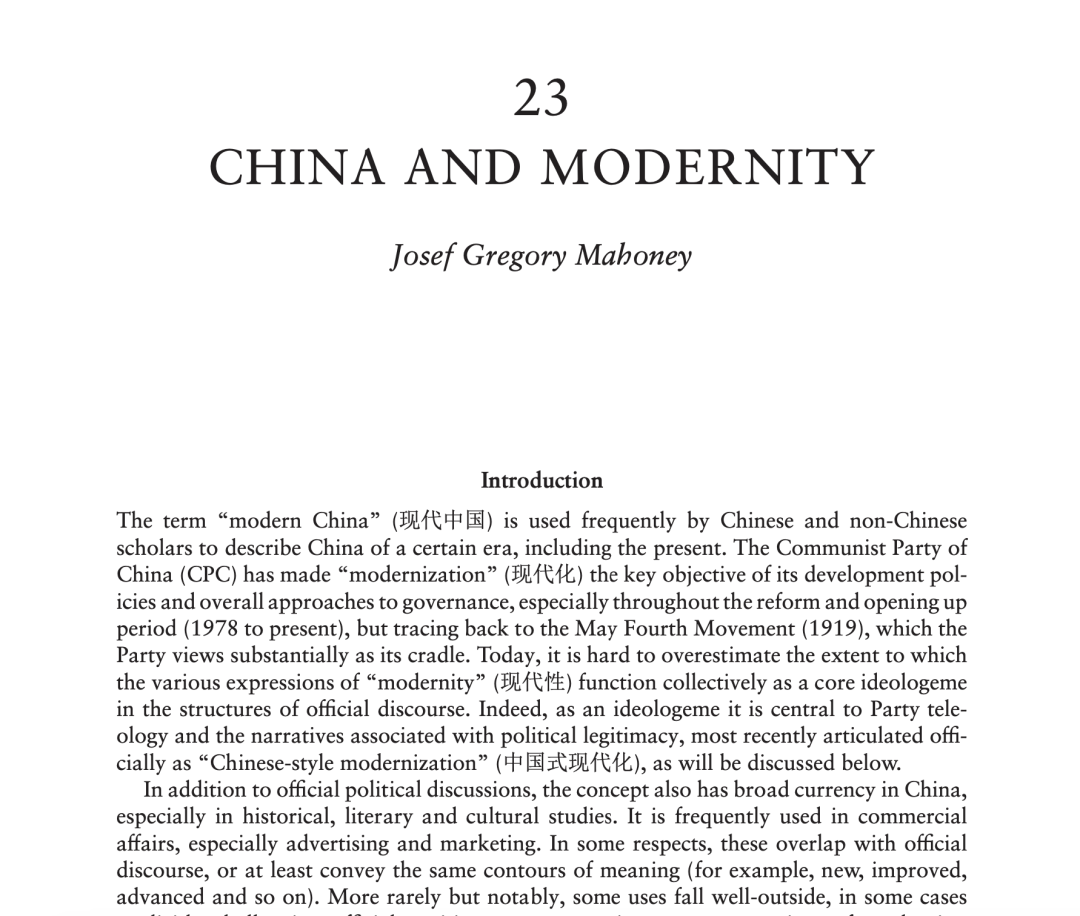近日,张昕副研究员参与主编的专著 ROUTLEDGE HANDBOOK ON GLOBAL CHINA 出版,马奥尼教授撰写了China and Modernity章节。

作者简介
马西米连·梅耶Maximilian Mayer德国波恩大学国际关系与全球技术政治助理教授
埃米利安·卡瓦尔斯基Emilian Kavalski波兰克拉科夫雅盖隆大学NAWA讲席教授
玛丽娜·鲁迪亚克Marina Rudyak德国海德堡大学中国研究所助理教授
张 昕华东师范大学政治与国际关系学院副研究员
内容简介
这本创新的《Routledge手册》揭示了全球中国的复杂性和变革性,促使我们重新评估现有的全球和区域动态理论。它鼓励理论创新、方法论反思和分析转型,为深入研究中国的全球互动提供了新的路径。书中的各章节提出了研究全球中国的三个核心承诺:倡导多元视角与非二元框架,运用细致入微的分析理解北京的跨国关系,并采用替代性的方法探索中国在国际事务中的不同发展路径。
该手册还识别并避免了一些阻碍理解全球中国的认识陷阱,如“他者化”和战略自恋。它提出了五个分析框架,涉及关系性、全球资本主义进程、语言与话语权力、行星规模的现代化以及实验主义,以指导未来的研究。通过采用这些框架,研究人员可以更深入地理解塑造全球中国的多维因素,并在全球合作、竞争与危机的背景下进行更为全面的分析。
目录
List of Figures
List of Tables
List of Contributors
Acknowledgements
Introduction: Global China: New Approaches to Research on China and the World
Maximilian Mayer, Emilian Kavalski, Marina Rudyak and Xin Zhang
I. Framing Global China
1. Global China, Sinology and Chinese Studies
Bart Dessein
2. China – Questions in Geography
Ingo Liefner
3. China’s Traditional, Modern and Neo–Socialist World Orders
William A. Callahan
4. Americans’s Reaction to China’s Rise: Power Shift, Problem Shift and Policy Shift
Steve Chan
5. China as a Driver of a Post–Western Global Imaginary
Yih-Jye Hwang
6. The China Challenge? A Holographic Global China Perspective
Chengxin Pan and Wanyi Zhao
II. Actors and Agencies of Global China
7. Great Power Relationships or Common Destiny? Chinese Government and Private Actors’ Long and Winding Road to Find a Place in Global Cyberspace
Rogier Creemers
8. International Actorness of the Chinese Local Governments
Dominik Mierzejewski and Anna Rudakowska
9. The Party-State’s Global Transgressive Political Activities and Influence Work
Ralph Weber
10. Chinese Relationality and the Design of Diplomatic Initiatives
Chiung-Chiu Huang
11. Exporting Chinese Digital Authoritarianism
Martin K. Dimitrov
12. From the Oriental to the Global City: China’s Urban Rise
Ryanne Flock and Elena Meyer-Clement
13. The State of the American and Chinese Technological Competition
Csaba Moldicz
III. Global China and International Organizations
14. Alternative Leadership: China and Global Finance
Jörn-Carsten Gottwald and Niall Duggan
15. Global China in Global Health Governance: Inherent Conflicts in Governance Norms
Lai-Ha Chan
16. Global Climate Governance in Transition and China’s Contribution
Hongyuan Yu, Bo Yu and Yunhan Yu
17. China in Global Cultural Governance: Crafting a Culture of Dialogue and Cooperation Through UNESCO
Tiewa Liu and Huawei Zong
18. China, Catalyst of Change: Altering the Dynamics of Development in the Global South
Jeremy Garlick
19. Decoding China's Reading of Global Development and Cooperation Norms
Marina Rudyak
IV. Global China’s Responses to Global Challenges
20. China and Sustainable Transition—Chairman Coal vs. Green Cyber-Dragon
David Tyfield
21. Meating Global China at Home
Tracey Fallon
22. Global China in the Age of Algorithms
Séverine Arsène
23. China and Modernity
Josef Gregory Mahoney
24. From “Debt Diplomacy” to Donorship: China’s Changing Role in Global Development
Pádraig Carmody, Tim Zajontz, and Ricardo Reboredo
V. Entangled Encounters: Internalizing Global China at Home and Localizing Global China Abroad
25. Innovation in China: Indigenous Efforts and Global Integration
Cong Cao and Yutao Sun
26. China’s Subnational Foreign Policymaking
Nicholas Thomas
27. Chinese Indonesian Intellectuals’ Quest for Post–Chineseness: Introduction of an Intellectual History Agenda
Harryanto Aryodiguno and Chih-yu Shih
28. Nationalism with Chinese Characteristics: Xinjiang and the Politics of (In)Security
David O’Brien and Melissa Shani Brown
29. Regionalizing Global China: Institutions, Competitions and Reactions
Tony Tai-Ting Liu
30. Limits of Chinese Infrastructure Power and the Local Political Economy in Developing Countries: Evidence from Pakistan
Muhammad Tayyab Safdar
31. Globalising China and Peripheral Urbanisation
Xiangming Chen
Epilogue: Epistemic Traps and Analytical Registers
Maximilian Mayer, Emilian Kavalski, Marina Rudyak, and Xin Zhang
Index
章节简介
CHINA AND MODERNITY由Josef Gregory Mahoney教授撰写,探讨了现代中国的概念及其在政治、文化和历史上的多重内涵。
文章强调了“现代中国”这一术语的广泛使用,尤其是在中国共产党(CPC)将“现代化”作为发展政策的核心目标之后。自1978年改革开放以来,现代化成为官方话语中重要的意识形态,尤其是被称为“中国式现代化”。该概念不仅在政治讨论中流行,还在历史、文学和文化研究中具有重要影响。
现代性与反现代性的讨论涉及多种对立观点,包括文化传统主义者和反现代主义者,他们对现代性持批评态度。此外,一些现代化的支持者对现代性所带来的某些后果表示关切,如异化和生态问题。
现代性作为时期化的分析中,文章指出西方的现代性通常与重大历史事件相连,例如19世纪巴黎的文化顶峰,同时也提到中国现代性始于19世纪中叶的鸦片战争。不同学者对中国现代性的起点有不同看法,强调了在清朝末期和民国初期的关键时刻。
政治现代性方面,文章探讨了新民主革命的重要性,指出五四运动不仅是思想觉醒的标志,也为CPC的成立奠定了基础。文中提到CPC与农民和工人联盟的特点,这是与经典马克思主义不同之处。
技术社会的现代性部分讨论了中国从技术社会向现代技术社会的转变,强调科学技术在国家独立和安全中的关键作用。文章分析了中国在科技领域的快速发展,并探讨了这种发展对社会和治理的深远影响。
最后,文章提到替代性叙述,包括中国大陆、台湾和香港的现代性观念,这些叙述往往与官方叙事相对立。整体而言,“现代”及“现代化”不仅是政策和发展的工具,更是CPC合法性的基础。



